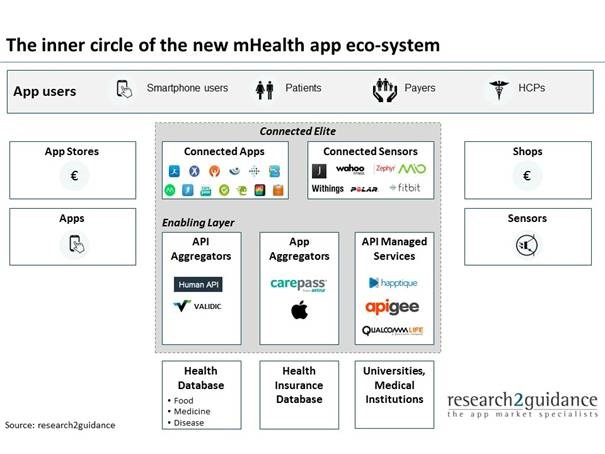May 21 2014
Three groups of mHealth app market players will form the inner circle of the new mHealth app ecosystem. Vital data like steps, calories burned and glucose readings will constitute the core value of the emerging mHealth app market. Traditional healthcare companies have to find their role not to be left aside.
There is a growing number of mHealth publishers who make use of the third party data in order to enrich the capabilities of their apps. Thanks to opening up their APIs, such publishers may better serve their core value propositions (e.g. weight loss support by incorporating diet plans and high quality food recognition tools) and gain a substantial competitive advantage over rivals. The more such companies, the more competitive the market and better app offering for the users.
In fact, 71% of mHealth of app publishers connect or plan to connect to an API in order to import or export health data. This is one of the results of the mHealth App Developer Economics 2014 study conducted in Q1 2014. A free copy of the 42 pages report on the state of the art mHealth app publishing can be downloaded here.

Sensor vendors such as Wahoo and Zephyr as well as a group of companies which enable interconnectedness (“Enabling layer”), support these publishers whose core value propositions rest on open APIs.
The new layer of “enabling” companies capacitates app-app, app-sensor and app-database connections. In general, such companies can be classified into three main segments:
- API aggregators which provide “one stop connecting models” for the health data APIs
- App aggregators which serve to collect mHealth apps in one place, and
- API Managed Service companies which provide the technical infrastructure to facilitate the connection of apps and sensors and medical databases
All of these, i.e. “open” app publishers, sensor vendors and the enabling companies constitute the 3 pillars which will form the core of the connected mHealth app economy.
The mHealth app economy is going to be fuelled by the accessibility of the vital (patient) data accessed via APIs. The majority of today’s captured and shared data is fitness and nutrition information like steps and calories. However, with the growing number of app users who regularly track e.g. glucose or blood pressure levels, or consult their apps for the purpose of medical examinations, we are going to witness an explosion in the amount of the aggregated and shared health data.
Strong market pressure e.g. rising healthcare costs and user demand, will facilitate this disruptive market change. The company which is going to be the first to skilfully make meaningful use of this big, aggregated health data might become the Facebook of the healthcare industry. Moreover, this market disruption will presumably take place rather sooner than later.
“The importance of aggregated patient data could be the difference in life and death, or simply a better outcome quicker.” Survey Participant
All healthcare market players must understand the impact of the new mHealth ecosystem on healthcare in general and, in particular, on their own business models. If they do not wish to be left out from the emerging, new healthcare delivery ecosystem, traditional market participants already need to start to reconsider their role in the market landscape.
The “mHealth App Development Economics 2014” free report provides information on the state of the art of the mHealth app market with an overview of its leaders.
The full report can be downloaded free of charge on: http://mhealtheconomics.com/mhealth-developer-economics-report/